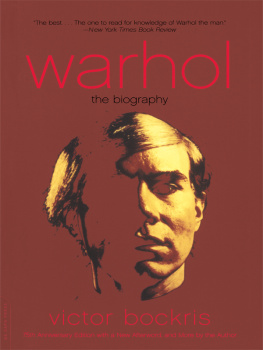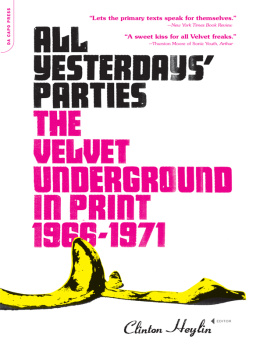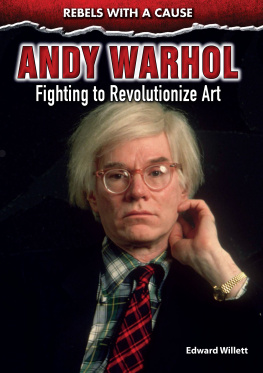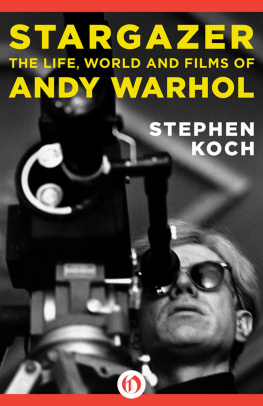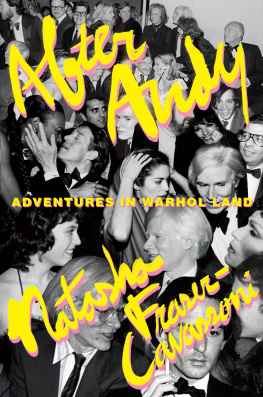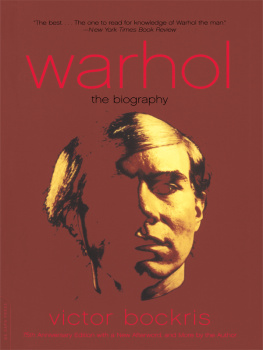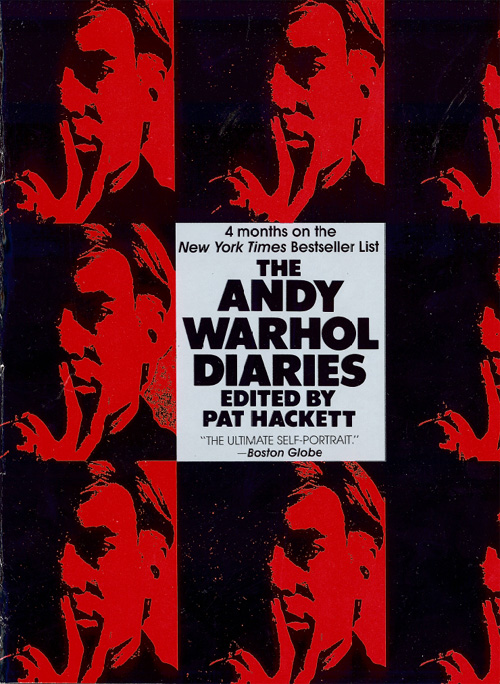A vivid picture of this enigmatic man. It abounds with celebrity gossip. It provides the definitive answer to the oft-asked question, What was Andy Warhol really like?
Philadelphia Inquirer
Fascinating disturbing decadent no one emerges unscathed. Warhol managed to crystallize the times in which he lived better than just about anyone.
Variety
Warhols diaries will provide laughs, gasps and thrills for those he mentions, or those who want a quick peek through their shades.
New York Daily News
This extraordinarily revealing diary paints a more penetrating portrait of our times Glitterati Era than any of Andys fabled canvases.
Forbes
The author sooner or later catches everyone he knows with their pants down. The tone is pure Warhol. At once insightful and distracted. A book that revels in nakedness.
Chicago Tribune
A remarkable tour of Warhols unusual frame of mind, the circles of slick celebrities he moved in, the friends he made, the enemies he made, the enemies he had, and the fears he could not shake. The material seems so scandalous its a wonder it made print.
Bergen Record
Gossip lovers will revel in the roster of names parading through Warhols lifeElizabeth Taylor, Jack Nicholson and Mick Jagger only head the listwhile others will find clues to Warhol the person in his descriptions and comments. The book does much to shed light on the character of a man who hid from an intrusive public while living in the blinding glare of a perpetual spotlight.
Houston Post
Will have many going great, wow, and even golly.
Vanity Fair
Great social history an anecdote a minute.
Village Voice
Selected by the Literary Guild and the Doubleday Book Clubs

PAT HACKETT editor of THE ANDY WARHOL DIARIES, condensed the diaries from its original twenty thousand manuscript pages. One of Warhols closest confidantes for many years, she co-authored Popism: The Warhol 60s and Andy Warhols Party Book with him, and co-authored the screenplay for Bad, Warhols cult movie classic.
Copyright 1989 by estate of Andy Warhol
All rights reserved. Except as permitted under the U.S. Copyright Act of 1976, no part of this publication may be reproduced, distributed, or transmitted in any form or by any means, or stored in a database or retrieval system, without the prior written permission of the publisher.
Grand Central Publishing
Hachette Book Group
237 Park Avenue
New York, NY 10017
Visit our website at www.HachetteBookGroup.com
www.twitter.com/grandcentralpub
First eBook Edition: November 2009
ISBN: 978-0-446-57124-1
My deep thanks to Steven M.L. Aronson who helped me edit the Diaries and who proved once again as he did in the past on books with Andy and methat he is diligent, vigilant, and brilliant.
P.H.
Jamie Raab at Warner Books was an astute and sympathetic editor. She combed the book so carefully and gave such unfailingly good advice for the many decisions that had to be made in a work of this size and scope that its hard to imagine how this could have been done without her.
Also thanks to: Vincent Fremont, Ed Hayes; Helen B. Childs, Rob Wesseley; Bob Miller, who got the project started at Warner Books; Lee Seifman, who worked so fast and with intelligence and good humor; Tony Bugarin, Allen Goldman, Heloise Goodman, Suzanne Gluck, Lew Grimes, Margery King, Harvey-Jane Kowal, Jesse Kornbluth, Gary Krampf, Jane Krupp, Alex Neratoff, Barbara OConnell, Jay Shriver, David Stenn, Allison Weiser.
Deep gratitude to my parents.
And last, thanks to Frederick W. Hughes, the executor of the Warhol Estate and Andys longtime business manager and friend, who understood that candor-of-the-moment is the essence of the diary as a literary form and was the first to champion the candid spirit of this diaryeven when Andys candor embraced Frederick W. Hughes.
P.H.
I met Andy Warhol in the autumn of 1968eight years after he painted his first Pop art canvases and just three months after he was shot and nearly killed by a woman who had appeared for a moment in one of his underground movies. During the previous spring the art-making/film-making/hanging-out setup known to sixties legend as the Factory had moved from its original location, a silvered loft on East 47th Street, to a white and mirrored loft that took up the whole sixth floor of 33 Union Square West.
Andy loved Union Squarethe trees in the park and the loft with its view of the stately Con Edison tower, its clock face shining like a neighborhood moon, giving the time day and night. Always considered an unofficial boundary between uptown and downtown, Union Square was near the bargain-shopping area on 14th Street. To the south, the West and East Villages and Soho were all within easy walking distance.
And, of course, a block away on Park Avenue South was Maxs Kansas City, the breeding ground for so many of the characters that wound up in Factory movies. Every night, celebrities of the art, fashion, music, and underground filmmaking crowds jammed themselves into favorite corners of the back room at Maxs and monitored each others clothes, makeup, wit, and love interests while they received exchange celebrities from out of towndirectors and producers from Europe or Hollywoodand waited to be taken away from all this (New York notoriety) and put into all that (global fame). Andys art hung on the wall.
I was an undergraduate at Barnard at the time, and going down to the Factory to see if Andy Warhol needed a part-time typist seemed like a good way to inject some glamour into my college years. I introduced myself to Andy, explaining that I was going to school, and he suggested I work for him just whenever I could. So I began going down to the Factory a few days a week after classes. He and I shared a 4 X 10 office piledas in time I discovered all his offices, whatever their dimensions, would be piledwith clutter. He would read the newspapers and drink carrot juice from Brownies, the health food store around the corner on 16th Street, while I transcribed tapes hed hand me of phone conversations hed had while he was in bed recuperating, first in the hospital and then at home in the narrow four-story Victorian house on Lexington and 89th that he lived in with his mother.
Andy had come to New York from Pittsburgh in 1949 and at first he shared apartments with other people. Eventually he could afford a place of his own. Then his mother suddenly arrived in town and moved in with him, her youngest son, saying she wanted to look after him. She may have decidedor just as likely, he may have told herthat he was working so hard he had no time to find a wife to take care of him, because when I met Julia Warhola one afternoon in 1969 she said hello, thought for a second, then concluded, Youd be nice for my Andybut hes too busy. (Andys mother lived with him in his house on 89th Street and Lexington Avenue until 1971. By then, apparently suffering from senility, she required constant care and Andy sent her back to Pittsburgh to the care of his brothers John and Paul. After suffering a stroke, she died in a nursing home there in 1972, but to even his closest friends whod often ask him, Hows your mother? Andy continued for years to say, Oh fine.)


